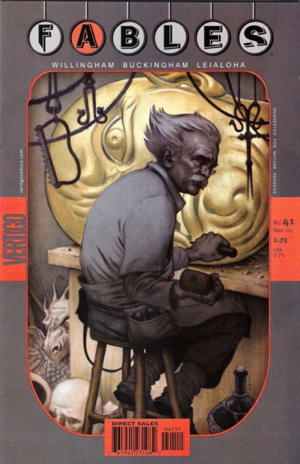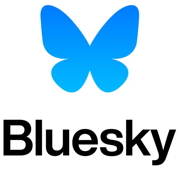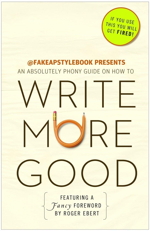Not a lawyer, not even a little bit.
 So I suppose the big, surprising news of the week is Bill Willingham announcing that he is giving Fables over to the public domain. According to his press release (warning: Substack link), his frustrations with the current publisher of Fables, DC Comics, has brought him to this decision.
So I suppose the big, surprising news of the week is Bill Willingham announcing that he is giving Fables over to the public domain. According to his press release (warning: Substack link), his frustrations with the current publisher of Fables, DC Comics, has brought him to this decision.
There has been an enormous amount of commentary on this already, and here I am slopping more on the pile. You’ll see a lot of people saying things like “I’m not a copyright lawyer, but” and then pontificating on the ramifications of this, and look, I’m only human. I’m gonna ramble on about it myself, because there are a few questions I have, a few responses I want to relate, and so on.
First off, can Bill Willingham even do this? Can you announce that something is just “public domain” now and that’s that? A few years back Tom Lehrer put all his music into the public domain, and apparently it was quite the chore on his part to do so. Granted, I’m getting the “quite the chore” part second hand, since I’m not finding a primary source for that, but Tom definitely dood it. And I presume the hard part was getting any record labels with whom he had prior arrangements to play along.
But what does this Fables announcement mean, exactly? Various commentators have noted dumping a thing into the public domain isn’t necessarily a thing you can do. The Techdirt article link I posted suggest that really the best you can do is say “I won’t, and no heirs (if any) will, sue you if you use this thing I own.” As pal Nat said on Bluesky, maybe Willingham can offer what amounts to a free license to everyone to use his Fables material…which may conflict with preexisting contracts Willingham has with DC.
Willingham’s take is that, while he’s under contract to DC, he himself can’t do anything with Fables outside their purview…but by offering Fables up for free, everyone else can. Now I’m sure there’s going to be a test case for this eventually, as, say, Dynamite decides to publish their own Fables book, and DC/Warner/Discovery says “hold on there, pardner,” and slaps a big lawsuit or, at minimum, a cease and desist on them. The legality of “anyone can use Fables is going to be settled by courts, I’m almost positive.
It’s that contract with DC that I’m now wondering about, after Nat pointed it out. I am presuming Willingham’s lawyers looked over everything and gave him the “sure, go ahead” with this announcement. As he says repeatedly, he is the sole owner of the property, and outside the agreements he has with DC, he can do whatever he wants with it. But I suspect DC is going to spend at least a little money in legal action deciding if in fact this is the case. Willingham said that part of what moved him to this course of action was that he couldn’t afford the time or money to sue DC, but he may end up in court about this anyway.
As anther Bluesky user said (and Neil Gaiman concurred), this may be less about getting Fables into the public domain than about basically putting the screws to DC regarding their own ability to make new Fables comics. After all, ol’ Bill was pretty pissed at DC. (Given that he lost control over a previous comic he created, Elementals, I imagine he’s pretty sensitive about ownership of his work.)
Also, as many folks have joked, “at last, we can do stories about Snow White and the Big Bad Wolf!” I know, I know, Fables primarily concerned itself with characters from fairy tales, all of whom were already in the public domain. The situations, stories, and character interpretations are all Willingham’s, of course, and that’s what he’s offering up. It’s like, anyone can do Frankenstein’s Monster, but only Universal Studios can do the Frankenstein’s Monster you immediately thought of when you read the name.
I’m reminded a bit of Dave Sim, who has said that Cerebus would enter the public domain upon his death. Again, this is likely the “no one will sue you” option more than actual public domain, but Dave owns Cerebus outright and, far as I know, has no legal contracts involving the character with outside parties. Quite a different situation than that with Fables, where an entertainment conglomerate has at least some minor interest in the property.
Basically what I’m saying is, nobody knows for sure how this is going to work until someone tries to make it work, and we see how DC reacts. Like, don’t look for “Stan Lee Presents Fables” from Marvel anytime soon. Though…if Marvel still has publication rights to comics based on Once Upon A Time, maybe we can get that crossover we’ve always wanted…!








Here’s my question, as I asked on the Beat: if now everybody has the right to do their own version of Fables, wouldn’t DC also fall under that “everyone”? So, in essence wouldn’t that mean that Willingham gave DC what he claims he was fight to avoid—control over Fables (of a sort)? I mean, there might be something in the contracts I am not privy to, and none of this might be legal at all, but what is to stop DC from putting out a version of Fables written by Tom King and drawn by Mitch Gerads now that it is in the public domain?
That press release is interesting reading. It’s disturbing to know that DC negotiates in such bad faith when big things are at stake, but it’s even more disturbing to know they lie to and underpay their talent on the regular. I wonder how many other writers and artists are fighting simply to get what they’re owed, much less what they’re actually worth.
Also, I would totally read a King/Gerads Fables book.
It will be interesting to see if other writers follow Willingham’s lead. I wonder if Alan Moore might consider declaring The Watchmen public domain, or if he can do that (considering that the concept was originally pitched to DC by Moore with the idea of using the–at that time– recently acquired Charlton Action Heroes)?
I read something the other day about Moore stating that all future royalties DC owes him should be paid to Black Lives Matter.
Also, out of curiosity, what is going on with The Elementals these days and who owns that intellectual property now?
Thom H: “That press release is interesting reading. It’s disturbing to know that DC negotiates in such bad faith when big things are at stake, but it’s even more disturbing to know they lie to and underpay their talent on the regular.”
I would caution you against taking Bill Willingham’s word at face value. I am not a DC apologist — they have certainly treated artists creators poorly in the past. But Bill Willingham also has a long history of extreme political leanings. As a commenter on another website summarized: “Since the article weirdly doesn’t mention anything about it: Willingham is a woman-hating far right asshole who was a huge industry insider for the Comicgate people, and Fables includes stuff like Snow White being forcibly impregnated by the Big Bad Wolf when they’re both drugged, who then refuses to let her have an abortion, even though he didn’t want it either.”
DC is no saint. But Willingham definitely has an axe to grind. Caveat emptor.
” As he says repeatedly, he is the sole owner of the property”
That was always my understanding.
“I know, Fables primarily concerned itself with characters from fairy tales, all of whom were already in the public domain”
I was going to say! There was a TV show a few years ago that used the same basic premise, and I think there have been a couple comics that are similar.
“anyone can do Frankenstein’s Monster, but only Universal Studios can do the Frankenstein’s Monster you immediately thought of when you read the name.”
Yup, they own ol’ squarehead.
“or if he can do that (considering that the concept was originally pitched to DC by Moore with the idea of using the–at that time– recently acquired Charlton Action Heroes)?”
I would think Dave Gibbons would veto that, at the very least.
“they have certainly treated artists creators poorly in the past”
The Swamp Thing/Rick Veitch/Jesus thing comes to mind!
@Snark Shark
You are probably right about Dave Gibbons vetoing it, and DC will probably retain the rights to The Watchmen for the next 50 years or whatnot, as long as they keep reprinting the original series…but it would be interesting if Alan Moore tried to go the same route as Willingham. It would also be interesting to see what people would do with The Watchmen if those characters suddenly became public domain.
And speaking of public domain, how much longer until the early Golden Age comic book characters from 1938 and 1939 –Superman, Batman, Namor, The Human Torch, Sheena–enter the public domain?
The ‘proto-superheroic’ characters created in the early-to-mid 1930s — Doc Savage, The Shadow and The Phantom — will be entering the public domain in the next 5-10 years.
Moore can’t make Watchmen public domain because neither he or Gibbons own it, and you can’t give away what you don’t own. The deal was that rights would revert to him once the book went out of print, which it never has. Until it does (or until it goes out of copyright in 2081 or so) it’s DCs. At the time it probably seemed certain he would get the rights after a few years, as pretty much all comics went out of print very quickly. Ironically by creating something so great that could be easily packaged as a single book he helped build a market that meant he will probably never get the rights.
Superman still has ten years to go. Even once it does go, you won’t be able to print a comic called Superman because DC own the trademark and trademarks are forever, and you will only be able to use elements from Action #1 – so Lois Lane, but no Jimmy Olsen for instance. At least until Jimmy goes out of copyright and even then it will depend. No signal watch until whenever that goes out of copyright.
The heirs to Arthur Conan Doyle have been successfully suing people for years after Sherlock Holmes went into the public domain as a character, because later story elements stay in copyright.
DavidG: I believe that, regardless of what the Conan Doyle estate may claim (and make claims they certainly have), every one of the original Holmes stories is now unambiguously in the public domain. Doyle’s final story was published in 1927.
@Roel Torres: While you’re right that I didn’t know those things, and while I do find the Comicsgate thing repulsive in particular, I’m not sure what Willingham’s political leanings have to do with him getting paid for the work he’s done.
Surely, if I’m going to be in favor of workers’ rights, I’m in favor of those rights for everyone? Unless there’s some link I’m missing between Comicsgate and DC’s known history of shorting their creators. I’m happy to be educated if there is.
@DavidG. and Oliver
Interesting information.
I was checking and it looks like the “Steamboat Willy” iteration of Mickey Mouse is about to become public domain next year, and Popeye will be public domain in 2025.
Ten to twelve years is not too far away. I wonder if Dynamite or other small press publishers will start using Golden Age DC and Timely(Marvel) characters at this point? Personally, I’d love to see a graphic novel or limited series set circa 1938 or 194O where Superman battles Namor or the Human Torch takes on Alan Scott Green Lantern. I would image that fifteen years from now basically all Golden Age characters will be public domain, including MLJ/Archie characters like The Shield, Black Hood, Comet, and Archie himself. It could be fun to see Jack Cole’s characters The Comet and Plasticman
in a story together. Batman could meet the Black Hood, The Shield could meet Captain America, Superman could team up with Steel Sterling, The JSA could meet The All-Winners Squad, Blackhawk could meet Airboy, etc, etc.
Personally, I prefer the Golden Age iterations of most DC characters, so I hope someone makes use of G.A. Superman leaping over talk buildings and vigilante Batman driving a red roadster. It could even be cool to see them in an anthology comic where each character gets ten story pages or whatever. It would even be cooler if some of the top Silver and Bronze Age talents are still around then to write and draw this stuff …Roy Thomas, Gerry Conway, Michael T. Gilbert, John Byrne, etc.
Actually, Thomas, Byrne, Michael T. Gilbert or whoever should just start creating and stockpiling these comics pages now–with the hope that they will see publication in ten to twelve years even if the writer or artist has passed away by then.
“I’m not sure what Willingham’s political leanings have to do with him getting paid for the work he’s done.”
My caution would be to say that DC might have been paying him for the work he’s done, but Willingham’s contrarian extremism would decide it was advantageous to claim he has not been paid and to portray himself as the wronged party. I would not take Willingham’s word at face value that he has not been paid. To me, his involvement with Comicsgate suggests that he is willing to make statements that are not the truth, the whole truth, and nothing but the truth.
Bill Willingham’s press release is presented strictly from his perspective. And his past history suggests he might not be a completely reliable narrator. DC might be in the wrong. But it’s also possible that Bill Willingham is not in the right. Often, the truth is somewhere in the middle.
Why oh why does DC continue to (allegedly) treat talented authors like Moore and Willingham like they are Bill Finger in 1940?
How much extra money could Moore have made for DC if they just…treated him nicely? Something something golden goose. How much could MARVEL have made from him if they were also nicer? There are very very few “shut up and take my money” comics auteurs, come on guys. Some talent really isn’t replaceable or interchangable.
Why do Grant Morrison and Neil Gaiman never seem to run into these problems? Do they just have better agents/lawyers or what?
“and DC will probably retain the rights to The Watchmen for the next 50 years or whatnot, as long as they keep reprinting the original series”
Oh yeah long term cash cow.
“Bill Willingham”
I don’t know about his political leanings, but I do remember his interactions with someone I used to know that he was rather prickly.
“Why do Grant Morrison and Neil Gaiman never seem to run into these problems?”
I dunno, but Neil has the option of NOT working in comics if he wants, as he’s also a successful author.
Also, their most popular comics for DC was on characters they didn’t create (Sandman, Doom Patrol), so I imagine the same issues don’t come up. I’m sure Morrison wasn’t expecting to walk away with the rights to Doom Patrol, no matter how successful it was.
“Why oh why does DC continue to (allegedly) treat talented authors like Moore and Willingham like they are Bill Finger in 1940?”
Short-sighted corporate supidity!
@Oliver one of the joys of copyright law is that it varies between jurisdictions. Conan Doyle died in 1930, so some copyright terms kick off from then rather than date of publication. The Conan Doyle estate sued Netflix over the Enola Holmes series as recently as 2020. It seems to have been settled, which is allegedly a big part of their MO – they sue, they get a slice, they go away.
https://www.theguardian.com/books/2020/dec/22/lawsuit-copyright-warmer-sherlock-holmes-dismissed-enola-holmes
“Why do Grant Morrison and Neil Gaiman never seem to run into these problems?”
I don’t know about Morrison, but Gaiman was involved in a pretyt high profile copyright case: https://www.hollywoodreporter.com/business/business-news/spawn-comic-book-todd-mcfarlane-neil-gaiman-286071/
Yeah Gaiman was involved in a high profile case, but it wasn’t Marvel or DC screwing him over. Marvel especially seems to bend over backwards to keep him happy. DC has kept a gentlemen’s agreement not use Death except with his approval/extreme situations for three decades.
Netflix did exactly the adaptation Gaiman wanted of Sandman and it’s NOT on HBO, unlike every other DC property.
I STRONGLY suspect competent representation is the answer here, not some special storytelling voodoo that Gaiman has.
Can he write stuff other than comics? Sure! But he keeps coming back to comics so it must be lucrative and/or fun for him. If Alan Moore said “hey I want to write Doctor Who episodes” who would say no?
Morrison didn’t create the Doom Patrol, but so much of it’s modern form is his creative work, including newly created characters and situations. Same with Final Crisis, etc. etc. Rebooting Superman and Batman are definitely work for hire but he sells sells sells, so with royalties maybe it doesn’t matter that much. Morrison has made an entire career or taking the stuff Moore refuses to work on anymore.
If you squint real hard DC might have a case that the Watchmen are acutally alt-Earth versions of the Charlton characters. #1 piece of evidence is Moore’s original proposal which was for those very same characters and Dick Giordano said “hell no, just do the same guys but make them look different enough that it won’t ruin Blue Beetle and Captain Atom forever”.
Almost everything major Moore has done is an homage to existing IP (Superman, Supreme, Top 10, Tom Strong) or a reboot (Miracleman, Swamp Thing, Watchmen) or abusing the public domain (League of Extraordinary Gentlemen).
He doesn’t create that many characters in the superhero genre. His really original stuff (V for Vendetta, Halo Jones, Promethia) tends to be more unique.
John Constantine was literally “the artist keeps drawing Sting into my book, better give a reason for him to be there”. Constantine is a background character until HELLBLAZER. “But he’s in CRISIS!” Yeah, so are Angle Man and Jonni Thunder.
@DK
It might not fly, but it would be interesting to see Alan Moore try to make The Watchmen public domain– especially as in his initial idea the characters he wanted to use were the MLJ/Archie superheroes, before DC acquired the Charlton Action Heroes…with The Shield being found dead…then The Shield was switched out for The Peacemaker, but ultimately The Peacemaker was morphed into The Comedian.
Of course, Dave Gibbons did create the character name Nite Owl, and all of The Watchmen’s costumes…but maybe Moore could try to make the concepts and character names public domain. Then again, I suppose Moore wanted The Watchmen to be a finite self-contained work.
It was interesting a few years back when Dynamite Comics published a Peter Cannon Thunderbolt mini-series which had pseudo Charlton Action Heroes/Watchmen characters in it.
I’ve also read that due to Charlton being lax with trademark registrations both Dan Garrett Blue Beetle…which was purchased from Victor Fox ..and Ted Kord Blue Beetle, as well as The Question, are all arguably in the public domain.
If nothing else, somebody could probably build off of Alan Moore’s original seed idea of The Shield being found dead, in about thirteen years or so–when most of the MLJ/Archie superheroes from the Golden Age will be in the public domain.
As for Jonni Thunder, I, for one, liked that character.